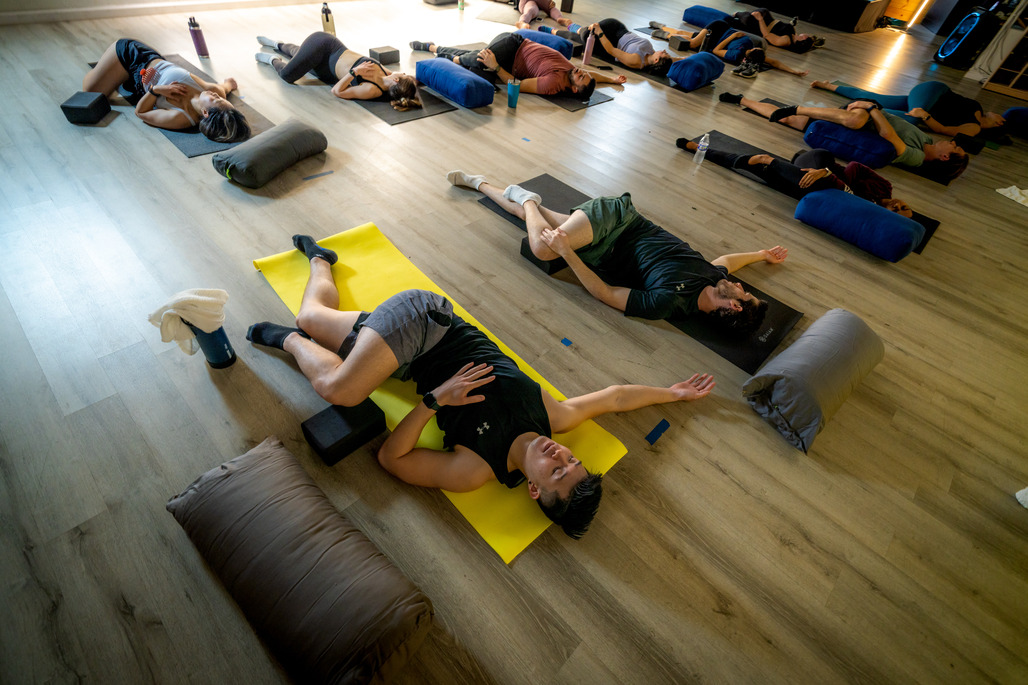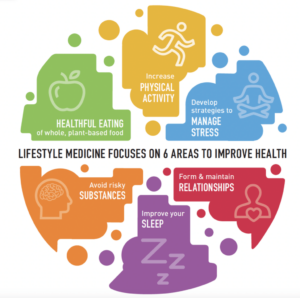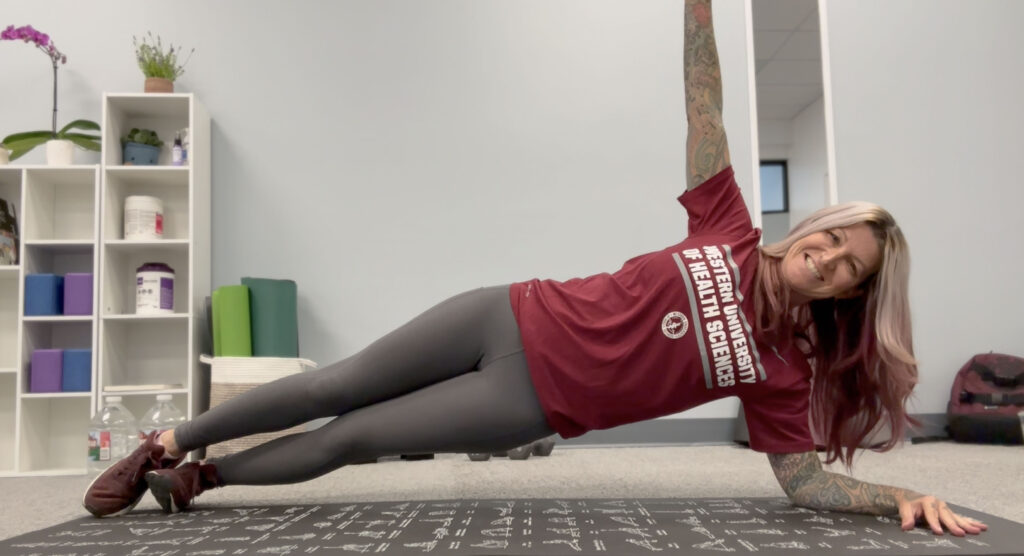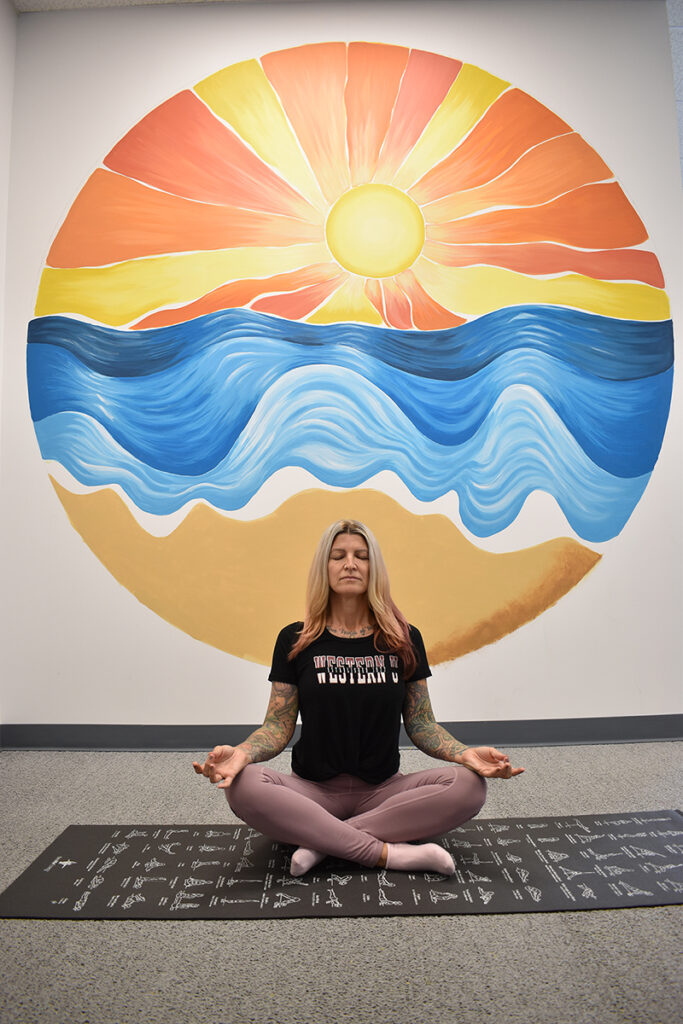
In a world where hectic schedules and mounting stressors seem to dominate our daily lives, prioritizing self-care has become increasingly essential. But what exactly does self-care mean, and how can we integrate it into our routines effectively? Enter lifestyle medicine – an evidence-based approach that not only addresses existing health concerns but also empowers individuals to proactively prevent and even reverse diseases by fostering positive lifestyle changes. At its core, lifestyle medicine focuses on optimizing six key areas of well-being: nutrition, exercise, stress management, sleep, relationships, and avoiding risky substances. These pillars serve as the foundation for a holistic approach to health. Join us as we explore practical and manageable steps within each of these areas, empowering you to embark on a journey of self-care and well-being.

NUTRITION – Do you eat your greens? A predominantly plant-based diet is an important strategy in preventing and treating chronic conditions. Such a diet is rich in fiber, antioxidants, and is nutrient dense. Avoid processed foods as much as possible. If you can’t read an ingredient on a food label, chances are it’s processed additives. Avoiding high volumes of processed foods and instead choosing a variety of minimally processed vegetables, fruits, whole grains, legumes, nuts, and seeds can help maintain weight, lessen the chance of chronic disease, increase energy and improve sleep. Plant based nutrition can be quite an adjustment. But each little step counts and adds up to big changes. Try things like serving your plate half full of vegetables, giving yourself a very small portion of meat. Designating a day of only eating plants like a “Meatless Monday”. Soups are a great start. You’ll be pleasantly surprised that by simply increasing your fiber with all these veggies, fruits, and beans how full and satisfied you feel. Not too mention, it’s rather affordable. For some recipe ideas to get you started visit the MEDWell TikTok or Instagram.
PHYSICAL ACTIVITY – Have you moved your body today? Regular, consistent physical activity is an important part of overall health and resiliency. Again, small consistent steps add up. Always take the stairs, park further away in a parking lot. If you have a busy schedule, take a series of small breaks for a quick 10-minute workout throughout the day. Take a brisk walk between classes or meetings. It will improve your focus and give you a boost of energy. A little exercise is better than no exercise. Try an activity you’ve never done before. Exercise can be fun. You’ve just got to find what works for you. Dancing around your house while you cook or clean is exercise. Just remember, you never regret a workout!
STRESS MANAGEMENT – What are 3 things you are grateful for? Practicing gratitude is a simple and effective tool in the battle against stress. Stress can lead to anxiety, depression, obesity, immune dysfunction and more. Managing stress can be more likely achieved by applying a variety of different techniques that can lessen anxiety and burnout. Things such as mindfulness, meditation and even prayer help you focus on the present moment and less on the things outside of your control. There are various apps out there for mindfulness meditations. Headspace even offers a substantial student discount, and is included in some insurance plans. You can also practice different breathing techniques to find which works best for you. Breathing exercises activate your parasympathetic nervous system and help you to achieve relaxation and calm. Jigsaw puzzles are even a mindfulness activity, drawing in your focus and attention. Walking in nature is not only exercise but can act as a natural mindfulness activity. It is difficult to think of your daily distractions while you are surrounded by the beauty of nature; breathing in the fresh air, smelling the sweet scent of flowers, listening to the birds chirping or water flowing.
RESTORATIVE SLEEP – Do you get enough sleep? Sleep delays or interruptions have been shown to cause sluggishness, low attention span, decreased sociability, depressed mood, decreased deep sleep, and decreased caloric burn during the day. Strive for 7 or more hours per night for optimal health. Improving sleep quality can improve your attention span, boost your mood, insulin resistance and can even reduce hunger. Dr. Pedram Navab (COMP ’01), a sleep medicine specialist shares in his book “Sleep Reimagined”, simple things you can do to combat insomnia like keeping a regular sleep schedule, getting up out of bed when you can’t sleep instead of tossing and turning. Returning to bed when you feel tired again. Eliminating screen time an hour before bed, morning walks outdoors, practicing mindfulness or reading a fiction book when you lie down.
SOCIAL CONNECTION – Have you called a love one lately? Positive social connections and relationships can affect our physical, mental and emotional health. Maintaining your relationships is important. Studies show that isolation is associated with increased mortality. So, take time to reach out to those that may not get many calls or visits. Show those you love gratitude (this again combats stress) and make time to socialize with your peers. Pets also count. Studies show when we pet an animal it releases oxytocin, which is a hormone that promotes social bonding, just like a hug!
AVOIDANCE OF RISKY SUBSTANCES – Is there a habit you’d like to kick? Use of tobacco and excessive alcohol consumption have been shown to increase the risk of chronic diseases and death. Patience and support are an important part of breaking habits. If you yourself are struggling, please reach out for help. If you suspect someone may be struggling, encourage them to seek help. Be a positive influence on another. Offer to take a walk, go for a run or attend a workout class together. But also remember to exercise personal boundaries to avoid burnout.
It is important to nourish your mind, body and soul through self-care. It is an on-going journey, a series of small positive lifestyle choices that add up to big changes. This is the one area of medicine where you have the ability to improve your own health. Isn’t that empowering? It’s a balancing act of intentionally making choices that better YOU. A choice you make in one area can have a positive affect on another. Yoga for example can be exercise, stress reducing, improve your sleep and if done in a group setting helps you bond with others. So let’s ask ourselves, “Is there an area in which I would like to improve?” What small steps can you take to find your self-care balance?


